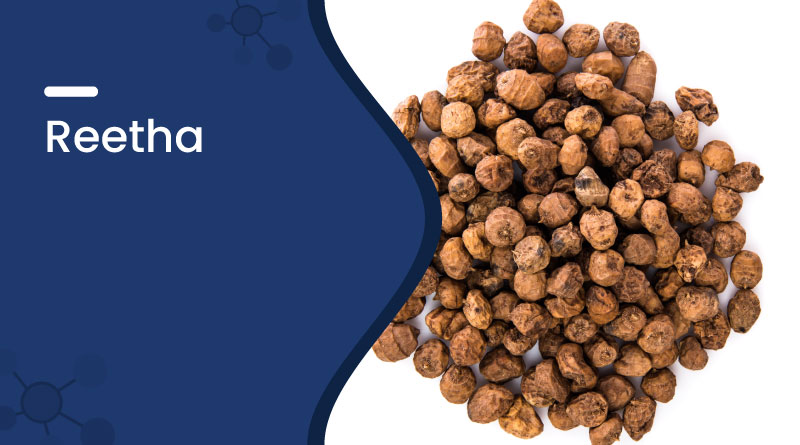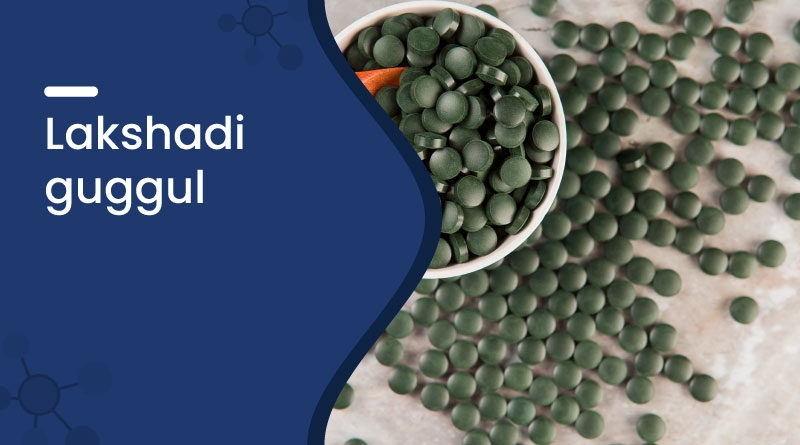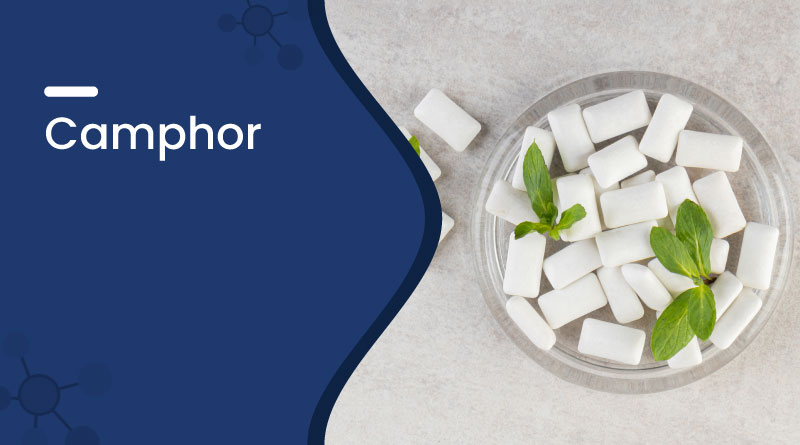Reetha (Soapnut): Benefits, Uses & Natural Hair Care Remedy


Reetha, also known as Soapnut or Sapindus mukorossi, is a versatile Ayurvedic herb widely valued for its natural cleansing and healing properties. The dried fruit of the Reetha tree produces a soapy lather when mixed with water, making it a popular natural cleanser for hair, skin, and clothes. Beyond its cleansing abilities, Reetha has numerous medicinal applications in Ayurveda. It has been traditionally used to treat dandruff, scalp infections, respiratory issues, and even as a mild expectorant and anti-allergic agent. Reetha is gentle and safe for skin and hair, making it a natural and chemical-free alternative to modern shampoos and soaps. With its cooling, soothing, and purifying nature, Reetha balances Kapha and Pitta doshas while supporting overall health.
Key Components of Reetha (Soapnut):
Reetha contains several natural compounds responsible for its medicinal and cleansing properties:
- Saponins: These are natural surfactants that produce a foamy lather when mixed with water. They cleanse hair, scalp, and skin without stripping natural oils.
- Flavonoids: Powerful antioxidants that protect skin and scalp from damage, reduce inflammation, and promote healing.
- Triterpenoids: Known for their antimicrobial, anti-inflammatory, and antifungal properties, making Reetha effective in treating infections.
- Sugars and Tannins: These support skin health and act as mild astringents to tighten pores and reduce oiliness.
These components make Reetha a potent yet gentle herb for hair care, skincare, and overall hygiene.
Importance of Reetha in Ayurveda:
In Ayurveda, Reetha is known as "Arishtaka" and is highly prized for its ability to cleanse without harming the body's natural balance. It is Tridosha-shamaka, meaning it helps balance all three doshas when used correctly, especially Kapha and Pitta. Reetha is known for its drying, astringent, and bitter properties. It is often used in hair oils, shampoos, and skin remedies to remove toxins, improve complexion, and treat dandruff or fungal infections. Reetha is also included in various Ayurvedic formulations for asthma, eczema, and skin allergies due to its soothing and anti-inflammatory effects.
Benefits of Reetha:
Reetha for Hair Problem
Reetha is an Ayurvedic remedy for strong, shiny, healthy hair. Its natural saponins cleanse the scalp and hair gently, removing dirt and excess oil without stripping essential moisture. It also strengthens hair roots, promotes hair growth, and reduces hair fall.
Reetha for Dandruff and Itchy Scalp
Its antifungal and antibacterial properties make Reetha an effective treatment for dandruff and scalp infections. Regular use of Reetha as a hair wash or mask helps soothe itchiness, reduce flakes, and keep the scalp clean and healthy.
Reetha for Skin Allergies and Eczema
Reetha has anti-inflammatory and antimicrobial effects that calm irritated skin, reduce redness, and heal rashes. It is often used in natural soaps and cleansers for people with sensitive skin or eczema. It clears pores and removes impurities without harsh chemicals.
Reetha for Respiratory Issues
In Ayurveda, Reetha is used in formulations to manage respiratory conditions like asthma, cough, and bronchitis. Its expectorant qualities help in thinning mucus, clearing chest congestion, and easing breathing discomfort naturally.
Reetha for Acne and Pimples
Reetha's cleansing action helps remove excess oil and bacteria from the skin, reducing acne and preventing future breakouts. Its astringent nature tightens pores and improves skin texture, giving a clearer and fresher look.
Reetha for Lice
The insecticidal nature of Reetha helps in eliminating lice from the scalp naturally without the need for harsh synthetic treatments. It paralyzes and removes lice and nits while nourishing the scalp.
Reetha for Oral Concerns
Reetha is sometimes used in Ayurvedic tooth powders for its antibacterial qualities. It helps reduce plaque buildup, strengthens gums, and freshens breath.
Reetha for Wound Healing
The anti-inflammatory and healing nature of Reetha can be used to clean wounds, minor cuts, or skin infections. It reduces swelling, fights infection, and speeds up recovery.
Reetha for Oily Skin
Its astringent and cleansing action helps manage oily skin by reducing sebum production, tightening pores, and preventing shine. Reetha face packs are ideal for people with oily and acne-prone skin.
How to Use Reetha?
Form: Dried fruits, powder, liquid extract, or infused oil.
Common Methods:
- Hair Wash: Soak Reetha pods overnight, boil, strain, and use the liquid to wash hair.
- Face Pack: Mix Reetha powder with rose water or honey and apply to acne-prone skin.
- Scalp Mask: Blend Reetha powder with yogurt or aloe vera to soothe an itchy scalp.
- Clothes Detergent: Place Reetha pods in a cloth pouch and drop them into the washing machine.
- Respiratory Remedy: In Ayurvedic formulas, Reetha is combined with Tulsi and Mulethi to ease a cough.
When to Use Reetha?
- Twice Weekly: As a shampoo replacement for hair cleansing.
- During Scalp Issues: For dandruff, lice, or itching, apply regularly until symptoms reduce.
- For Acne-Prone Skin: Use face pack 1–2 times a week.
- In Monsoon or Humid Weather: To reduce fungal infections or oily skin problems.
- For Natural Laundry: Use as needed, especially for baby clothes or delicate items.
How Does Reetha Work?
Reetha works by releasing saponins when mixed with water. These saponins create a natural soap-like lather that cleanses dirt, oil, and microbes from the skin, hair, and surfaces. Its antioxidants and anti-inflammatory properties repair damage, fight infections, and soothe irritation. Reetha also promotes better blood circulation to the scalp and skin, supporting growth and healing. Its natural detoxifying nature purifies the body both internally and externally.
Who Should Use Reetha?
- People with sensitive or oily skin
- Individuals suffering from dandruff or hair fall
- Those looking for natural, chemical-free cleansers
- People with respiratory allergies or mild asthma
- Eco-conscious individuals avoiding harsh detergents
Safety Measures:
- Avoid contact with your eyes, as it may irritate them.
- Always patch test before skin use.
- Use diluted or prepared form—raw pods can be too strong.
- Not for internal consumption unless prescribed by an Ayurvedic practitioner.
- Keep in a cool, dry place to maintain efficacy.
Conclusion:
Reetha is nature’s answer to safe, effective, and holistic cleansing. Whether for your hair, skin, clothes, or even minor health conditions, Reetha offers a chemical-free and eco-friendly solution backed by centuries of Ayurvedic wisdom. Its gentle yet powerful properties make it suitable for everyday use and all age groups. Affordable, accessible, and highly beneficial, Reetha is an all-in-one herb that refreshes, purifies, and heals naturally.
Frequently Asked Questions (FAQs):
Q: Can Reetha be used daily on hair?
A. No, twice or thrice a week is enough. Daily use may dry out the scalp.
Q: Is Reetha safe for colored or treated hair?
A. Yes, it is gentle and chemical-free, but always do a patch test.
Q: Can Reetha be used on babies?
A. Yes, but only in diluted form for laundry. Avoid direct skin or hair application on infants.
Q: Does Reetha cause hair dryness?
A. If used too frequently or without conditioning, it may dry out hair. Combine with Amla or Shikakai for balance.
Q: Is Reetha edible?
A. Not directly. It should only be consumed under Ayurvedic supervision in specific formulations.








 Added!
Added!